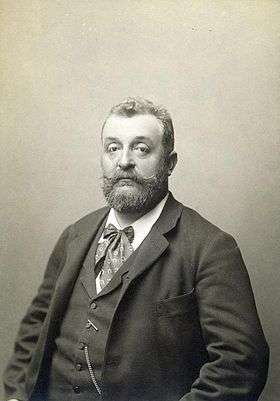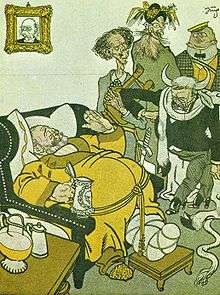Georg Ritter von Schönerer

Georg Ritter von Schönerer (17 July 1842 – 14 August 1921) was an Austrian landowner and politician of the Austro-Hungarian Monarchy active in the late 19th and early 20th centuries. A major exponent of pan-Germanism and German nationalism in Austria as well as a radical opponent of political Catholicism and a fierce antisemite, his agitation exerted much influence on the young Adolf Hitler.
Life
He was born in Vienna as Georg Heinrich Schönerer; his father, the wealthy railroad pioneer Matthias Schönerer (1807–1881), was knighted by Emperor Franz Joseph in 1860. He had a younger sister, Alexandrine, later director of the Theater an der Wien, who strongly repudiated her brother's attitudes.
From 1861 he studied agronomy at the universities of Tübingen, Hohenheim and Magyaróvár (Ungarisch-Altenburg, today a campus of the University of West Hungary). He went on conducting the business affairs of his father's estate at Rosenau near Zwettl in the rural Waldviertel region of Lower Austria, where he became known as a generous patriarch of the local peasants and great benefactor. Shaken by the Austrian defeat in the 1866 Austro-Prussian War, the dissolution of the German Confederation and the foundation of the German Empire in 1871, young Schönerer became a political activist and ardent admirer of German chancellor Otto von Bismarck.
During the turmoil of the Panic of 1873, he was elected to Cisleithanian Austria’s Imperial Council parliament as a liberal representative, but became more and more a German nationalist as his career progressed. A great orator and firebrand in parliament, he broke with his party three years later, agitating against "Jewish" capitalism, the ruling Catholic Habsburg dynasty and the Austro-Hungarian occupation of Bosnia and Herzegovina in 1878, which he stigmatized as a betrayal of German interests. Schönerer's attitudes and political talent were attractive for national liberal sections of the German-speaking population contemplating the lost chance of a Greater German nation-state, ultimately squandered in the failed Revolutions of 1848.
Tensions rose in 1879 after the accession of Austrian minister-president Eduard Taaffe, whose monarchist politics Schönerer and his followers considered "anti-German". By 1882 he together with politicians like Viktor Adler and Heinrich Friedjung had worked out the Linz Program ("not liberal, not clerical, but national") of the German national movement, which would become a considerable force in Austrian politics. The program aimed at the autonomy of the predominantly German-speaking Cisleithanian crown lands, including the split-off of "alien" Galicia, Bukovina and Dalmatia, and their affiliation with the German Empire ruled by the House of Hohenzollern. These plans even fit with the ideas of Polish, Hungarian and Croatian nationalists, but would have entailed the disempowerment of the House of Habsburg and the Germanisation of the Czech lands in Bohemia.
By the peak of his career he had transformed into a far-right politician, considered by left-leaning liberals to be even a conservative. Schönerer developed a political philosophy that featured elements of a violent racial opposition to Jews which disregarded religious affiliations. His campaigning became especially vocal upon the arrival of Jewish refugees during the Russian Empire's pogroms, starting in 1881. He fiercely denounced the influence of "exploitative international Jews", and in 1885 had an Aryan paragraph added to the Linz program, which led to the ultimate breach between him on the one hand, and on the other hand Adler and Friedjung.
Schönerer's approach became the model for German national Burschenschaften student fraternities and numerous associations in Cisleithanian Austria. In turn, Jewish activists like Theodor Herzl began to adopt the idea of Zionism. Schönerer's authoritarianism, popular solidarism, nationalism, pan-Germanism, anti-Slavism, and anti-Catholicism appealed to many Viennese, mostly working-class. This appeal made him a powerful political figure in Austria and he considered himself leader of the Austrian Germans.

In 1888, he was temporarily imprisoned for ransacking a Jewish-owned newspaper office and assaulting its employees for reporting the imminent death of the admired German emperor Wilhelm I prematurely. This action increased Schönerer’s popularity and helped members of his party get elected to the Austrian Parliament. Nevertheless the prison sentence also resulted not only in the loss of his status as an noble, but also of his mandate in parliament. Schönerer was not re-elected to the Imperial Council until 1897, while rivals like the Vienna mayor Karl Lueger and his Christian Social Party had taken the chance to get ahead.
Later in 1897, Schönerer still was able to help orchestrate the expulsion of Minister president Kasimir Felix Graf Badeni from office. Badeni had proclaimed that civil servants in Austrian-controlled Bohemia would have to know the Czech language, an ordinance which prevented many ethnic German-speakers (the majority of whom could not speak Czech) in Bohemia from applying for governmental jobs. Schönerer staged mass protests against the ordinance and disrupted parliamentary proceedings, actions which eventually caused Emperor Franz Joseph to dismiss Badeni.
During these years, while the Kulturkampf divided Imperial Germany, Schönerer founded the Los von Rom! movement, which advocated the conversion of all Roman Catholic German-speaking people of Austria to Lutheran Protestantism, or, in some cases, to the Old Catholic Churches. Schönerer became even more powerful in 1901, when 21 members of his party gained seats in the Parliament. His career crumbled rapidly thereafter, however, due to his forceful views and personality. His party suffered as well, and had virtually disintegrated by 1907. But his views and philosophy, not to mention his great skill as an agitator, would go on to influence Hitler and the Nazi Party as a whole.
Schönerer died at his Rosenau manor near Zwettl, Lower Austria on 14 August 1921. He had arranged to be buried near Bismarck's mausoleum on his estate at Friedrichsruh, Lauenburg in present-day Schleswig-Holstein, northern Germany.
Notes
Regarding personal names: Ritter is a title, translated approximately as Sir (denoting a Knight), not a first or middle name. There is no equivalent female form.
He spearheaded an anti-Catholic movement under the slogan "away from Rome". His followers called him "the Leader" (Führer), another term which his movement most likely introduced into the vocabulary of nationalist politics.
Further reading
- Whiteside, Andrew G. (1975). The Socialism of Fools: Georg Ritter von Schönerer and Austrian Pan-Germanism. University of California Press.
- Evans, Richard J. The Coming of the Third Reich. Penguin Group, ISBN 1-59420-004-1 (hc), ISBN 0-14-303469-3 (pb). Pages 42–45
| Wikimedia Commons has media related to Georg Ritter von Schönerer. |